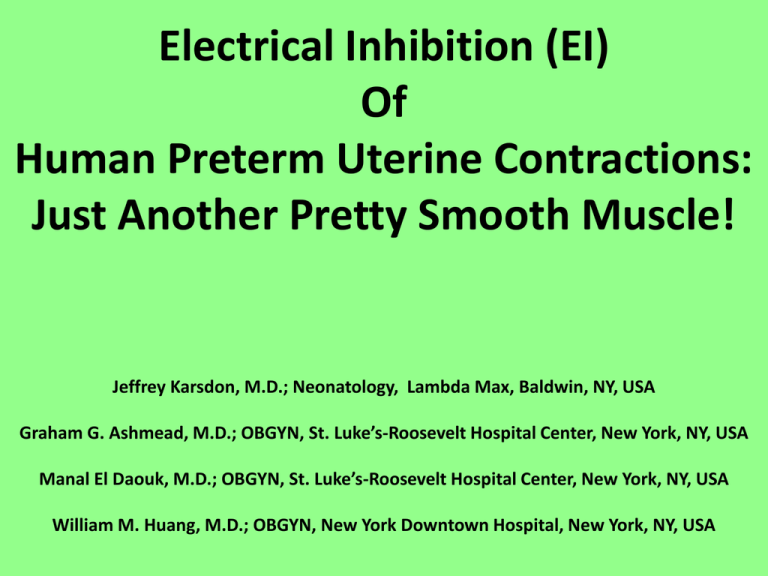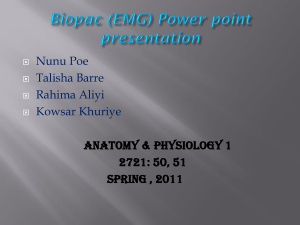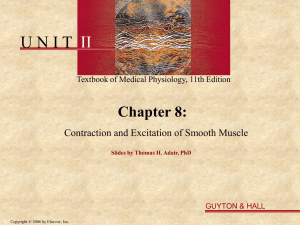Electrical Inhibition (EI) of Human Preterm Uterine Contractions
advertisement

Electrical Inhibition (EI) Of Human Preterm Uterine Contractions: Just Another Pretty Smooth Muscle! Jeffrey Karsdon, M.D.; Neonatology, Lambda Max, Baldwin, NY, USA Graham G. Ashmead, M.D.; OBGYN, St. Luke’s-Roosevelt Hospital Center, New York, NY, USA Manal El Daouk, M.D.; OBGYN, St. Luke’s-Roosevelt Hospital Center, New York, NY, USA William M. Huang, M.D.; OBGYN, New York Downtown Hospital, New York, NY, USA Hypothesis: Electrical pacemaker will decrease smooth muscle contractions or tone. Electroceutical therapy or Electrical Inhibition (EI). Background: Smooth muscles produce A contractions or tone e.g. preterm uterine contractions or vascular tone (blood flow). Pharmaceuticals do not control smooth muscles efficiently and have many side effects. EI of electrical (EMG) activity does B efficiently control smooth muscle contractions or tone with few side effects: A. Human uterine smooth muscle, increased spontaneous EMG activity precedes contractions (top, contractions; bottom, EMG). B. Human corpus cavernosum smooth muscle, decreased spontaneous EMG C activity (arrows) decreased smooth muscle tone allowing increased blood flow (top, blood flow; bottom, EMG). C. Rat uterine smooth muscle, electrical inhibition (EI) of spontaneous EMG (arrows) decreases contractions and tone (top, contractions; bottom, EMG). Wolfs et. al. Obstet Gynecol. 1971;37:241-246 Jiang et. al. J Urol. 2005;174:1917-1920 Karsdon (unpublished) Method: EI pacemaker/generator sends the electrical current to an electrode catheter that is placed next to the smooth muscle of the cervix. A. EI generator: A. 1. Power cable 2. Step down transformer 3. Power connector cable 4. EI generator with connector 5. Electrode catheter connector cable 6. Electrode catheter B. Electrodes directly onto the uterus. C. Transvaginal electrode catheter (TVC) placed into the vaginal canal with the tip next to the smooth muscle of the rat cervix. 1 2 3 4 5 D. TVC placed into the vaginal canal with the tip next to the smooth muscle of the human cervix (arrow). D. C. 6 B. Method: Outcomes Uterine smooth muscle contraction or tone measurements: 1) rabbit and rat, intrauterine pressure (IUP); 2) rat, EMG and pup birth intervals (BI); 3) human, uterine contractions (tocodynomometer/toco) and fetal heart rate (FHR) for side effects. Results: A. A. EI in the rat decreased EMG activity (spectrum analysis): 1. amplitude 2. spike frequency 3. area-under-the-curve or power B. EI decreased the EMG dependent smooth muscle tone and contractions, both B. amplitude and frequency, in all species studied; top panel: rabbit, EI (arrow up) decreased IUP only in the study horn and control horn not affected; middle panel: rat, EI (arrow) decreased the EMG (bottom) and IUP (top); bottom panel: human, EI (arrows) subjectively toco (bottom) was decreasedj and had no effect on FHR (top) or maternal heart rate (not shown). Note! decreased resting uterine smooth muscle tone for several minutes after only 2 seconds (RMS) of EI (B, solid lines in middle and bottom panels) even without EI applied. Karsdon et. al. Am J Obstet Gynecol. 2005; 193, 1986-1993 Results: EI increased smooth muscle relaxation (table): 1) EI decreased rabbit IUP. 2) EI, both directly and by TVC, increased rat pup BI by 1941% and 628% respectively. 3) EI in women decreased toco contraction frequency or increased peak-to-peak (P-P) interval time. Mechanism: EI is thought to: 1) hyperpolarize the cell membrane; 2) resulting in decreased membrane depolarization; 3) thus decreased electrical activity; 4) producing decreased smooth muscle contractions or tone. Category Gestational Age mean±SD N Controls mean±SD N EI mean±SD Rabbit Direct Uterine Pacemaker (IUP ) 30.3±1.6 (days) 14 33.0±15.0 (mmHg) 14 17.6±12.9* (mmHg) Rat Direct Uterine Pacemaker (BI) 21.0±0.8 (days) 35 17.5±2.2 (minutes) 17 357.1±150.3* (minutes) Rat Vaginal Pacemaker (BI) 21.6±1.3 (days) 19 17.2±8.3 (minutes) 36 125.2±43.9* (minutes) Human Vaginal Pacemaker (P-P) 31.1±2.2 (weeks) 8 3.2±1.3 pre 3.2±1.3 post (minutes) 8 3.8±1.4* (minutes) X X X DECREASED TONE Conclusions: Smooth muscle contractions/tone are the result of EMG activity Decreased EMG activity results in decreased smooth muscle contractions/tone Decreased vascular smooth muscle tone is associated with increased blood flow Electrical Inhibition (EI) decreases EMG activity EI is localized unlike pharmaceuticals and may hyperpolarize the cell membrane EI decreased (uterine) smooth muscle contractions/tone in animals and humans EI may have a use in decreasing human smooth muscle contractions/tone: uterine contractions of preterm births; neonatal pathologies e.g. persistent pulmonary hypertension Contact: Dr. Jeffrey Karsdon, M.D. Email: JK_MD@yahoo.com







